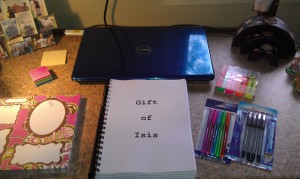Having just closed the book, so to speak, on the first draft of my fifth novel, MUSE, it’s a good time to think about what I’ve learnt while writing this manuscript.
Lesson #1: What works for others, doesn’t necessarily work for me. I’ve previously mentioned I would love to be able to write from a detailed outline. I’ve tried it but can never stick to the plan. What does work for me is a very loose outline on index cards. It helps keep the story’s path clear in my mind while still allowing the flexibility to move, add or discard scenes as I need to.
Lesson #2: I need deadlines. Without them, I don’t write. I am fortunate to be a part of a wonderful goal-setting group. At the start of each week, we email around our goals and account for the previous week’s progress. I don’t like to admit I failed to achieve my goals so this often pushes me well past the stage where I would have otherwise stopped. And one day when I have to write to someone else’s deadlines, this practice in meeting goals will pay off.
Lesson #3: I need to keep my mind in my story’s world. This means focusing my free time reading on relevant topics and not spending too much time in front of the tv. The story flows best if I can keep myself in my imaginary world. It starts to fall apart when I get distracted. This year’s season of Master Chef almost killed my story.
Lesson #4: The this-is-crap stage. With every new manuscript, I wholeheartedly believe the first two thirds is the best thing I’ve ever written. Then I hit 70,000 words and the this-is-crap zone where doubt creeps in: This story is terrible. The plot is too contrived. I’m a lousy writer. What made me think I could write another book? The next 10,000 or so words are invariably painful, progress is slow and I spend weeks, or sometimes months, stalled here. This time, I knew what to expect and when the 70,000 word this-is-crap stage arrived, I pushed through, telling myself I had been here before and it would pass. And the knowledge that this was my this-is-crap stage did help, to an extent. It was still agonising and I wrote far slower than I had until then. But by recognising this as another stage of my creative process, I was able to move on.
Lesson #5: It doesn’t matter if I can’t write the ending on the first draft. I usually finish just two or three scenes short of the end and it’s not until the first, or even second, re-write that the ending comes out. That’s okay. For me, the first draft is about learning the story and getting to know the characters. I need to sit on the ending, puzzle it through, spend some time getting to know the story again, and then that ending, previously so elusive, usually flows.
So now it’s time to put away MUSE and let it simmer in my subconscious for at least six months before I return to it with fresh eyes and, hopefully, bucketloads of enthusiasm. For now, I’m moving on to a new round of edits on another project. I’ll see you on the other side!
What have you learnt while writing your current manuscript?

